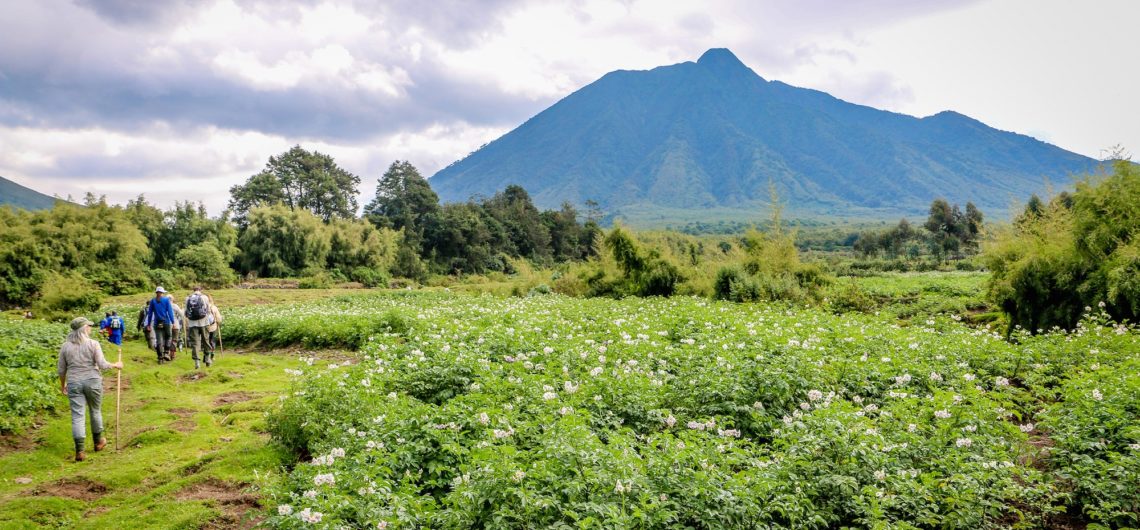(1) You can fly in direct from almost anywhere
Burundi to the south, Uganda to the north, the Democratic Republic of the Congo to the west, Rwanda could be regarded as one of the most unreachable areas on the continent by both road and air. You can fly into Rwanda from just about anywhere on the planet and the country runs an airline (Rwand Air) that connects it to almost all major African cities.
(2) The Mountain Gorillas
Rwanda has an amazing Mountain Gorilla population. These inhabit Volcanoes National Park, in the far north-west of the country (where it rubs up against Virunga National Park in the DRC and Mgahinga Gorilla National Park in Uganda to create one colossal cross-border expanse of wildlife and wonder). Access is, of course, carefully controlled – but, as of 2015, 10 Gorilla groups can be glimpsed by tourists, with 80 passes available per day. The experience is nonetheless inimitable.
(3) More to mountains than Gorillas
As its name suggests, Volcanoes National Park incorporates five of the eight volcanoes which give the ridgeline of the Virunga Mountains a lava-born grandeur. Mount Karisimbi is the highest of these behemoths – tall enough, at 14,787ft (4,507m), for snow to be present on its summit during the annual dry season of June-August (indeed, its name loosely translates as “snow” in the local language, Kinyarwanda). For all this, it can be conquered on foot (thankfully, the volcano is regarded as inactive). The hike upwards – which takes two days, and is described as “strenuous yet rewarding” – is detailed in full at the national park website (volcanoesnationalparkrwanda.com/activities/mount-karisimbi-hike.html).
(4) The Lions
Rwanda’s Akagera National Park (akageranationalpark.org) is home to a full quota of the Big Five (lion, rhino, elephant, buffalo, and leopard). Spreading out on the east flank of the country, shaped by the border with Tanzania and the River Kagera, this verdant enclave of savannah and wetland suffered during Rwanda’s turbulent Nineties, when poaching and subsistence hunting robbed it of most of its inhabitants. But it has regathered itself considerably since 2009, when it was taken under the wing of rescue and rehabilitation group African Parks (see african-parks.org/the-parks/akagera). Seven South African lions were introduced in 2015, and 20 black rhinos were brought in as recently as last month. These are still faltering baby steps, but Akagera is walking a road to recovery.
(5) Amazing treeline
There are further members of Rwanda’s National Parks club. Pinned to the south-west of the country, where it brushes the border with Burundi, Nyungwe Forest National Park (rwandatourism.com/destinations/nyungwe-national-park) is an example of Africa at its most raw – a dense patch of pristine jungle where chimpanzees leap from branch to branch, and more than 300 bird species caw and call in the upper leaves. This is a remote and undeveloped realm – though not so undeveloped that tourism steers clear.
(6) The country has moved on from its darkest hours
The Rwandan Genocide of April-July 1994 was one of humanity’s most desperate episodes – a horrifying period of bloodshed when up to one million members of Rwanda’s Tutsi population were massacred by the majority Hutu government. This was one of the consequences of the Rwandan Civil War (1990-1993) – and, in turn, caused the displacement of two million more (largely Hutu) people. Bleak and depressing stuff – and if you find yourself in the capital Kigali, you should surely acknowledge it. The city’s Genocide Memorial Centre (kgm.rw) cradles the remains of some 250,000 victims of this ethnic cleansing, and makes as difficult and as disgusted a statement on man’s inhumanity to man as any similar landmark amid the “Killing Fields” of Cambodia or the concentration camps left behind by Nazi Germany. That said, while what occurred in Rwanda 23 years ago will always cast a shadow, it is not a dominating factor of life in a country that has certainly found its feet in the subsequent two decades. Since the turn of the millennium, average life expectancy has risen from 47 to 60 years.
(7) Rwanda is pretty safe
While travelers in sub-Saharan Africa should always take the standard precautions when it comes to drinking water, personal security and other such fragments of common sense, Rwanda is a country which can be explored with reasonable confidence. The Foreign and Commonwealth Office has a few words of warning on parts of the borders with the DRC and Burundi, but otherwise reassures would-be visitors that “Rwanda is generally safe and crime levels are relatively low.” Full details via gov.uk/foreign-travel-advice/rwanda.
8) Its capital is an intriguing place for a day or two
Pitched roughly at the geographic centre of the country, Kigali could probably be called a work in progress, fanning out, in that sprawling fashion of major African cities, across hillsides and slopes. With a population of more than a million, this is no tiny conurbation, but it reveals its charms gracefully. Both the central districts of Kacyiru and Kiyovu have lively restaurant scenes, and the Serena Hotel (serenahotels.com/serenakigali) offers five-star accommodation and a refreshing courtyard swimming pool.
(9) There is no sea, but there is plenty of water
Defiantly land-locked, and kept away from the life-giving depths of Lake Victoria by 100 miles of Tanzanian landscape, Rwanda nonetheless has a shoreline to call its own. This is on Lake Kivu, which defines some of the frontier with the DRC. While this is ranked as the second smallest of the African Great Lakes – just 56 miles long by 31 miles wide at its fullest dimensions – this liquid-blue puddle on the map is worth an afternoon or several of any traveler’s time. It makes for a perfect place to pause enroute between Nyungwe and Volcanoes National Parks – perhaps in the town of Gisenyi (also known as Rubavu), where resort hotels dot the water’s edge, and broad sunsets await each evening.
Content sourced from: http://www.telegraph.co.uk/travel/destinations/africa/rwanda/articles/Ten-reasons-why-you-should-visit-Rwanda/


Comments